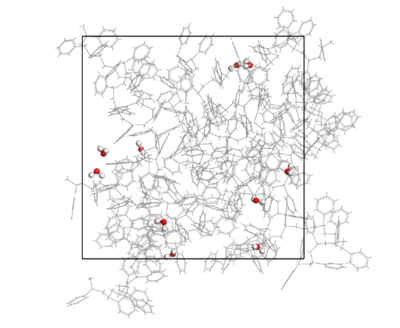Thesis Topic:
The processing of plastics typically involves working with the material in its molten state. Understanding the flow properties, particularly the viscosity, of the molten plastic is crucial for assessing its suitability for specific processing methods. The viscosity of polymer melts is complex and exhibits a dependence on shear rate, often referred to as shear-thinning behavior or structural viscosity. This behavior is attributed to the elongation of the polymer chains under applied shear.
To gain a better understanding of this phenomenon, molecular dynamics simulations will be conducted at IKV. Molecular dynamics simulations provide atomistic-level insights into the behavior of materials. The goal of this thesis is to explore the application of molecular dynamics simulations in determining viscosities under various external and internal influences. Examples include studying the effects of pressure, temperature, foreign particles, and chain scissions. Understanding these factors is particularly relevant in the context of plastic recycling, where chain scissions and the presence of foreign particles are common. Being able to quantify the influence of these factors is essential for the successful implementation of a circular economy for plastics.
Research Group:
This thesis will be carried out within our research group, which focuses on the molecular dynamics analysis of polymers and the investigation of media-induced aging processes in plastics. Our research covers a wide range of topics, including plastic recycling, the development of recycling processes, the study of failure mechanisms in plastics, and measures to enhance the durability of products during manufacturing, contributing to a more sustainable use of finite resources.
Objective:
The objective of your thesis is to determine the viscosity of polypropylene and polyethylene through simulation and experimentation. The specific scope and content of your work will be defined collaboratively, based on the type of thesis and your personal interests. The following tasks provide a general overview, and adjustments can be made according to your preferences:
For a Bachelor's thesis, your tasks will include:
- Developing and implementing a simulation routine for determining the viscosity of polypropylene and polyethylene
- Applying the simulation with variations in parameters such as temperature, pressure, or chain scissions
For a Master's thesis, your tasks will include:
- Developing and implementing a simulation routine for determining the viscosity of polypropylene and polyethylene
- Applying the simulation with variations in parameters such as temperature, pressure, or chain scissions
- Experimentally validating the simulation results with respect to the modified parameters
- Extending the simulation methodology to other types of polymers
Profile:
- Technical or scientific background (e.g., mechanical engineering, materials science, chemistry, physics)
- Prior experience in molecular dynamics simulations is beneficial but not mandatory
- Interest in independent and flexible work within a motivated team
If you are interested in pursuing a thesis at IKV on this topic, please contact me or drop by for a coffee. We can discuss the specific details, content, and timeline based on your individual circumstances.
Contact Person:
Felix Melzer, M.Sc.
Phone: +49 241 80-28373
Email: felix.melzer@ikv.rwth-aachen.de

